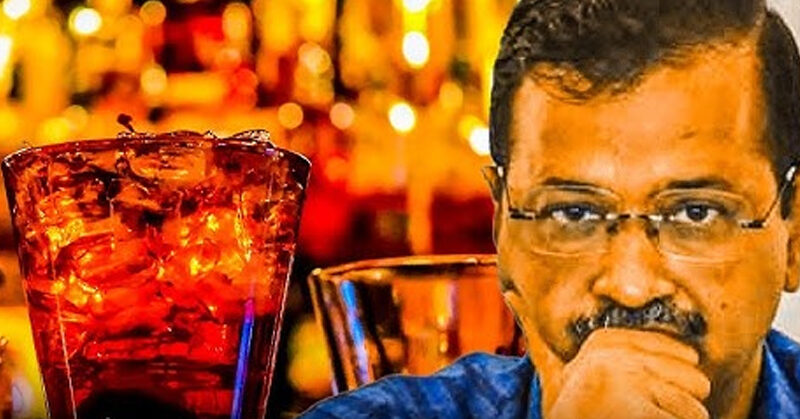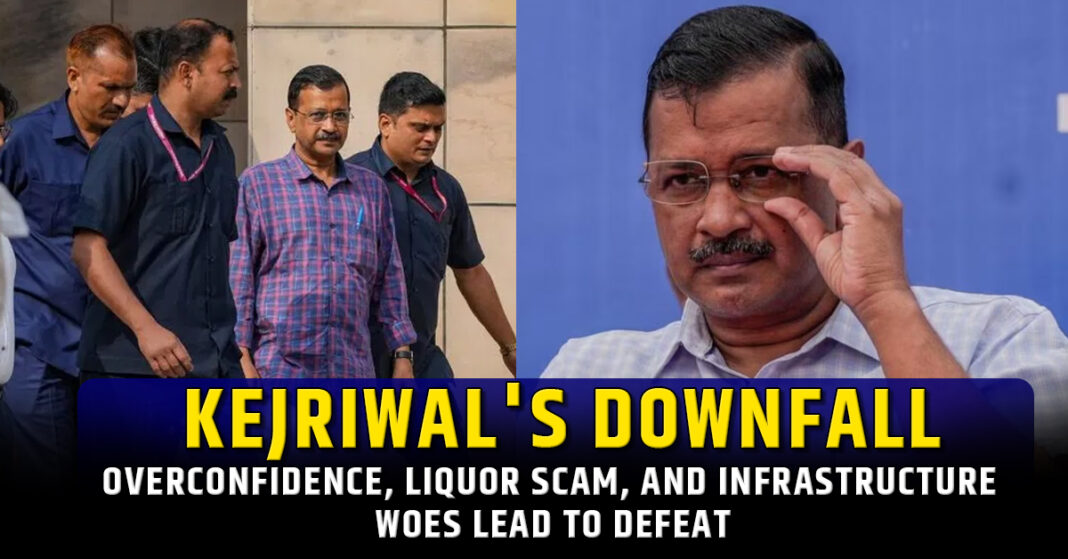Kejriwal’S Downfall: The Aam Aadmi Party (AAP), which once ruled Delhi with a majority for ten years, suffered a major setback in the 2025 elections, securing only 22 seats. In contrast, the Bharatiya Janata Party (BJP) won 48 seats, reclaiming power in Delhi after 26 years. The reasons for kejriwal’s downfall and AAP’s downfall are multi-faceted, ranging from corruption allegations to public dissatisfaction with governance.
Kejriwal’S Downfall: How the AAP Lost Delhi After a Decade
Table of Contents
The Liquor Scam That Tainted Kejriwal’s Image

Kejriwal’S Downfall: Arvind Kejriwal, who built his political career on the promise of honesty and transparency, found his reputation shattered by the 2021 excise policy scandal. The alleged liquor scam led to the arrests of key AAP leaders, including Manish Sisodia, Sanjay Singh, and even Kejriwal himself. The Enforcement Directorate (ED) and the Central Bureau of Investigation (CBI) intensified their scrutiny, further eroding public trust.
Kejriwal’s attempt to frame the elections as a referendum on his integrity—stating that voters should reject him if they found him dishonest—failed to resonate. The damage to his clean image, once a pillar of AAP’s appeal, proved irreversible.
Internal Conflict and Party Fragmentation
Kejriwal’S Downfall: Internal dissent and leadership disputes also contributed to AAP’s decline. The appointment of Aatishi as Chief Minister in Kejriwal’s absence was met with resistance from several party members. Prominent Dalit leaders like Sandeep Valmiki and Rajendra Gautam defected, while senior leader Kailash Gehlot joined the BJP. This organizational instability weakened AAP’s grassroots network, leaving polling booths deserted of party workers on election day.
Overpromising and Underperforming on Infrastructure
Kejriwal’S Downfall: AAP’s failure to deliver on key infrastructure projects—particularly roads and sanitation—became a significant election issue. Despite promising to transform Delhi into a modern metropolis and clean the Yamuna River, little progress was visible. Public grievances over deteriorating road conditions, especially in riot-affected areas like Okhla, further dented voter confidence.
The party’s repeated clashes with the Lieutenant Governor and the central government painted an image of inefficiency. Voters perceived AAP as more focused on political battles than actual governance.
Liquor Policy Backlash: Women’s Concerns Ignored
AAP’s controversial excise policy, which privatized liquor sales and allowed deep discounts, alienated a crucial voter base—women. The opposition, particularly the BJP and RSS, capitalized on this, emphasizing how alcohol abuse negatively impacted lower-middle-class households. The message that liquor fueled domestic violence and economic instability resonated strongly, turning many female voters away from AAP.
Even social activist and Kejriwal’s former mentor Anna Hazare criticized AAP’s liquor policy, stating that it contradicted the party’s original principles. This reinforced the perception that Kejriwal had abandoned his moral high ground.
Misreading Women’s Priorities: Freebies vs. Basic Needs

kejriwal heavily promoted schemes like free bus rides and direct cash transfers of Rs 2,100 for women. However, many female voters prioritized access to clean drinking water and better living conditions over these benefits. A resident of Patel Nagar summarized the sentiment: “What is the use of free bus rides when we have to walk 1.5 km to fetch water?”
This miscalculation cost AAP dearly, as women voters—traditionally a strong support base—shifted their allegiance to BJP.
The ‘Rewadi’ Debate: Freebies vs. Employment
AAP’s strategy centered on countering BJP’s criticism of welfare schemes, branding them as essential ‘Rewadis’ (freebies) rather than handouts. The party conducted 65,000 meetings across Delhi to justify its free electricity, water, healthcare, education, bus travel, and pilgrimage schemes.
However, many voters, especially the middle class, expressed a preference for job opportunities over subsidies. A resident of Pandav Nagar remarked, “If the government gives us work, we will pay for our own water and electricity.” This shift in sentiment weakened AAP’s core electoral appeal.
Conclusion: AAP’s Road to Redemption
Aap’s historic loss underscores the danger of overconfidence, governance failures, and a tarnished public image. To rebuild, the party must address internal divisions, focus on core governance issues, and regain the trust of its voter base. Whether AAP can bounce back from this setback remains to be seen, but for now, Delhi has chosen a new political direction under BJP’s leadership.










